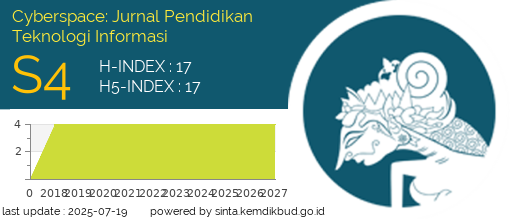THE DEVELOPMENT OF WEB BASED LEARNING MEDIA NETWORK AND COMPUTER BASIC AT SMK NEGERI 1 LEMBAH MELINTANG
DOI:
https://doi.org/10.22373/cj.v4i2.7797Keywords:
web-based learning media, media development, vocational education, learning outcomes, web based system.Abstract
The purpose of this research is to produce a valid web-based learning media, practical, and effective in basic computer and networking subjects. This web-based learning media is designed to improve student’s understanding so that it can improve to learn the outcomes. The method in this study uses Research and Development (R and D) with 4-D development procedures (Define, Design, Develop, Desseminate). The data of analysis technique uses descriptive analysis techniques to describe the validity, practicality, and effectiveness of web-based learning media. The results obtained of this development research: The validity of web-based learning media is declared valid on the media and material aspects. The practicality of web-based learning media from teacher and student responses is stated to be very practical. The effectiveness of web-based learning media is stated to be effective in improve to learn the outcomes. Based on the findings of this study it is concluded that the web-based learning media is valid, practical, and effective to be used as a learning aid in basic computer and network subjects.
References
Yusufhadi Miarso, Menyemai Benih Teknologi Pendidikan. Jakarta: Kencana, 2004.
Rusman, Belajar dan pembelajaran berbasis komputer: mengembangkan profesionalisme guru abad 21. Bandung: Alfabeta, 2013.
Depdikbud, Struktur Kurikulum Sekolah Menengah Kejuruan (SMK)/Madrasah Aliyah Kejuruan (MAK), no. 021. Jakarta: Depdiknas, 2018.
Yudhi Munadi, Media Pembelajaran Sebuah Pendekatan Baru. Jakarta: Gaung. Persada Perss, 2008.
S. B. A. Z. Djamarah, Strategi Belajar Mengajar. Jakarta: Rineka Cipta, 2010.
A. R. Nana Sudjana, Teknologi Pengajaran. Bandung: Sinar Baru Algesindo, 2013.
R. Abdullah, Easy & Simple Web Programming. Jakarta: PT. Elex Media Komputindo, 2016.
A. Zaki, Kiat Jitu Membuat Website Tanpa Modal. Jakarta: Elex Media Komputindo, 2009.
Elizabeth Walter, Cambridge Advanced Learner’s Dictionary. Electric Dictionary: Cambridge University Press, 2008.
Rusman, Belajar dan Pembelajaran Berbasis Komputer Mengembangkan Profesionalisme Guru Abad 21. Bandung: Alfabeta, 2012.
Sugiyono, Metode Penelitian Pendekatan Kuantitatif, Kualitatif dan R&D. Bandung: Alfabeta, 2018.
M. I. S. Sivasailam Thiagarajan, Dorothy S. Semmel, Instructional Development for Training Teachers of Exceptional Children. University of Minnesota, 1974.
Miarso, Standart Kompetensi dan Sertifikasi Guru. Bandung: Alfabeta, 2007.
Downloads
Published
Issue
Section
License
Authors who publish with Cyberspace Journal agree to the following terms:
- Authors retain copyright and grant the journal right of first publication with the work simultaneously licensed under a Creative Commons Attribution License that allows others to share the work with an acknowledgement of the work's authorship and initial publication in this journal.
- Authors are able to enter into separate, additional contractual arrangements for the non-exclusive distribution of the journal's published version of the work (e.g., post it to an institutional repository or publish it in a book), with an acknowledgement of its initial publication in this journal.
- Authors are permitted and encouraged to post their work online (e.g., in institutional repositories or on their website) prior to and during the submission process, as it can lead to productive exchanges, as well as earlier and greater citation of published work (See The Effect of Open Access).



















